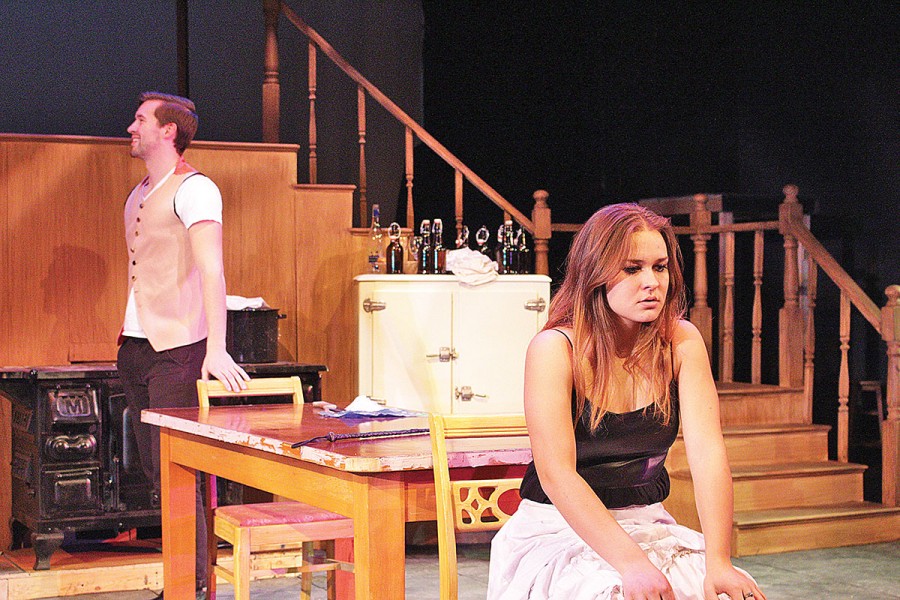World premiere of “Miss Julie” translation
Courtesy Angela Riddel
Ian Davis (left) and Christina Pinciotti (right) play two of the three characters in the play, “Miss Julie.” Davis plays Jean and Pinciotti plays Miss Julie.
November 18, 2014
Filed under Community
What is the modern role of women? How do humans compete for life? Why do people struggle to survive? These questions and others are addressed in August Strindberg’s play “Miss Julie.”
The University of Toledo Department of Theatre and Film will present the world premiere of “Miss Julie” as translated by Daniel Thobias.
“University of Toledo Assistant Professor of Theatre, Daniel Thobias, is a native Swede, and his new translation of ‘Miss Julie’ captures the colloquial tone and poetic nature of Strindberg’s language that is so often lost in English translation,” according to a press release from Angela Riddel, promotions specialist for the College of Communication and the Arts.
Directed by Cornel Gabara and performed by three UT students, “Miss Julie” will take the stage of the Center Theatre in the Center for Performing Arts Nov. 21-23 and Dec. 5-7.
“‘Miss Julie’ is about human struggle in every way, said Christina Pinciotti, a second-year theatre major and cast as Miss Julie, in an e-mail interview, “deep down this play is all about human nature, and all of us are humans.”
The play features Pinciotti as Miss Julie and Ian Davis as Jean. The characters are set opposed to each other in a struggle to the first and the last people to experience life’s dynamic issues.
“Miss Julie depicts a battle of class and gender, as Miss Julie strives to escape the restrictions of her upper class lifestyle through a dangerous and rash relationship with one of her father’s servants [Jean],” Riddel said.
Miss Julie falls in love throughout the play.
“I feel like Miss Julie is portrayed as being a character that transforms from a very strong woman to one that has fallen because of her love for Jean,” Pinciotti said.
According to Pinciotti, Miss Julie is an example of how love and money do not always produce a happy ending.
“Miss Julie learns the hard way that money and power are not all that is needed to triumph in the world, and that social status does not determine success,” Riddel said.
The play’s themes center on the role of gender and class in our modern society.
“Another goal of Thobias’s translation was to use language, as Strindberg did in Swedish: to reveal the class level of the characters,” Riddel said.
Social class was an important aspect that was considered when the play was being translated, according to Thobias.
“Miss Julie is more educated, so her manner of speaking had to reflect that. Christine, the cook, is from the lower classes and her language skills reflect her station,” Thobias said. “Jean, the valet, is self-taught, in that he learned by observing and mimicking the society people he emulated. But his education is incomplete. So the words he uses and his grammar are a mix of lower class and high society.”
Another major theme of the play involves the degeneration of Miss Julie as a result of her love interest and class background.
Over the course of the play she contemplates whether the struggle of life is worth dealing with. Eventually she comes to the conclusion of suicide.
“She gets to the point at the end of the play where she accepts she has to die,” Pinciotti said. “To be honest, this is the most difficult role I’ve ever had. I really have to explore every facet of the human condition and that can lead to some very dark places.”
Pinciotti said that playing Miss Julie has been a challenge for her.
“No character I have ever played has been this wild, seeing that her emotions are everywhere and can change on a dime, so that part is new for me,” she said.
According to Pinciotti, working with Gabara is unique because he focused on the abstract nature associated with the play.
“Gabara’s approach to ‘Miss Julie’ transcends the naturalistic and realistic approaches that most directors take to when directing ‘Miss Julie,’” Riddel said. “In Gabara’s version, the audience will move with the characters of the play from the exterior reality of the physical world to the tumultuous interior labyrinth of the human mind and imagination.”
Pinciotti said besides the innovative set, lights and sound, people should come see “Miss Julie” in order to connect with its deep human issues.











